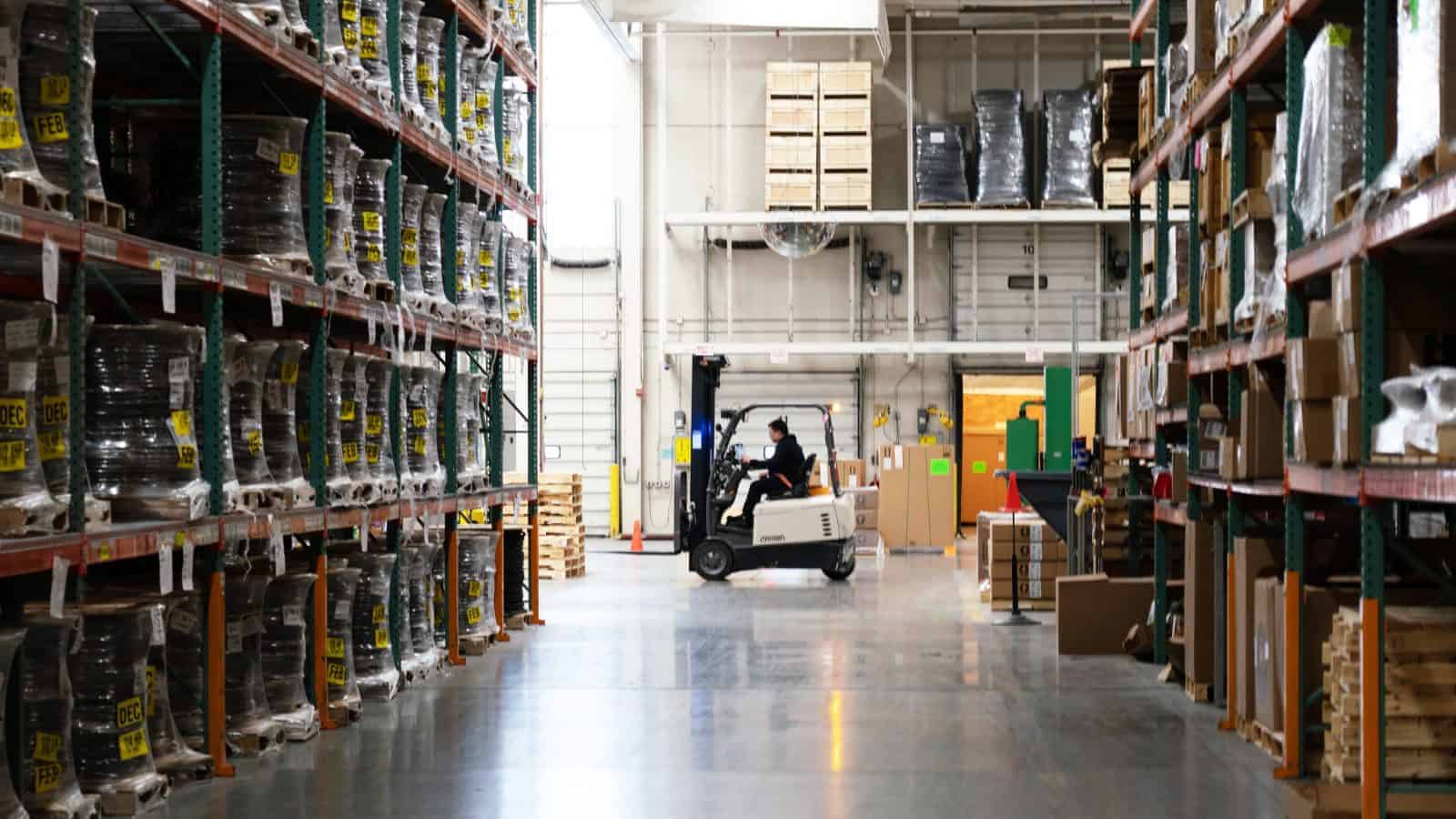Manufacturers Speak About Impact of Tariffs
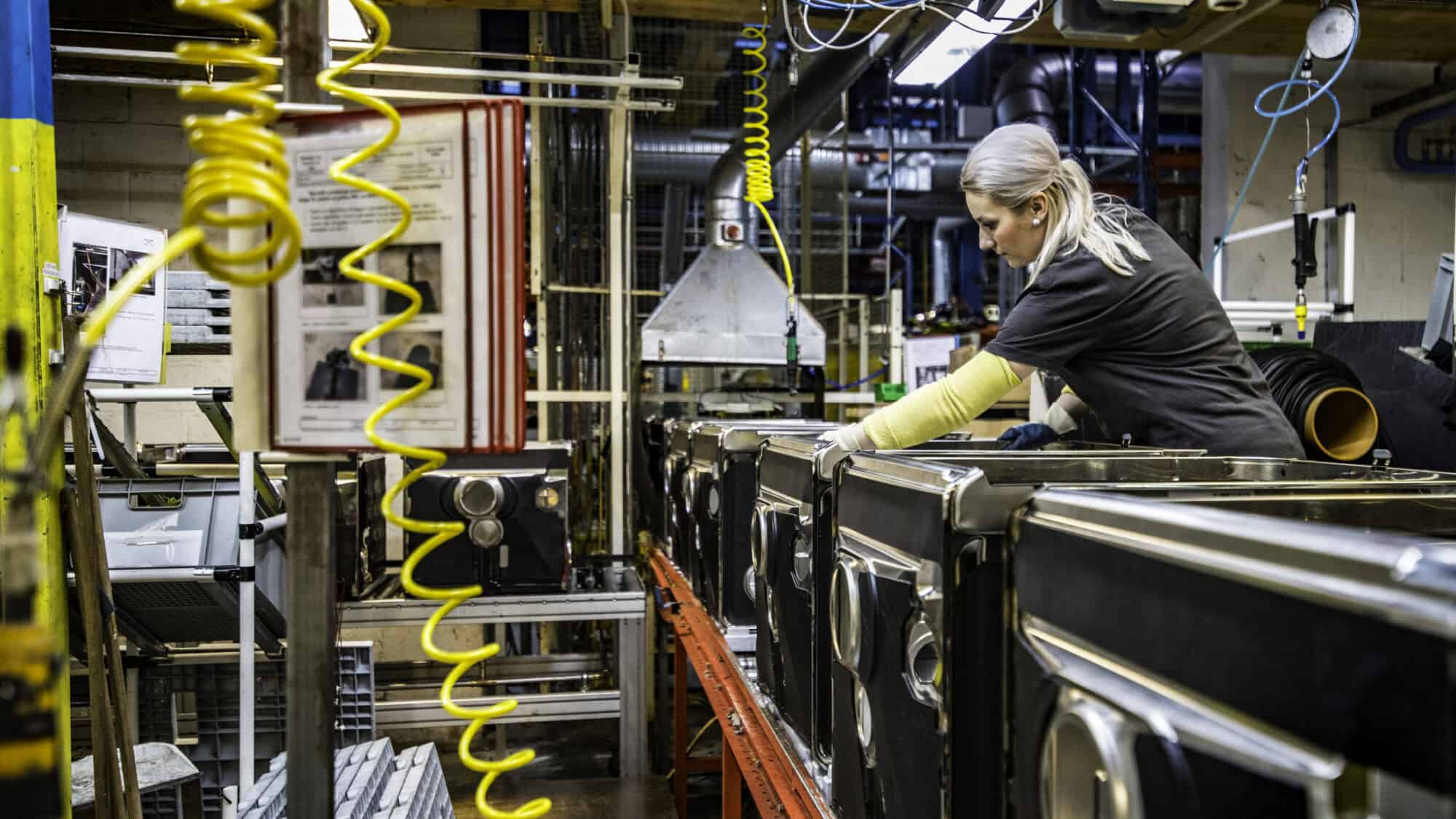
Across the country, manufacturers are telling their stories of shop floor operations under U.S. tariffs, the first of which went into effect March 13. The consensus: tariffs have made things harder all around
- Jeremy Rosenbeck is president of Cincinnati, Ohio–area manufacturer Republic Wire, Inc., which makes copper wire products for the construction industry. In anticipation of tariffs, Rosenbeck “over the winter [ordered] an extra two months’ worth of copper rod (worth tens of millions) to give him enough tariff-free raw material for his business if a new trade agreement isn’t quickly worked out” (Cincinnati Enquirer).
- Republic Wire has nearly 200 employees and each year does approximately $500 million in sales. About 10% of that is outside the U.S.
- Rosenbeck, who says he “understand[s] what they’re trying to do with the tariffs,” nonetheless told the Enquirer that spring is a bad time for uncertainty in the construction sector, as it’s when builders make their plans for the rest of the year. “Higher prices on materials could mean fewer construction projects, which could mean a slowdown for the industry, fewer jobs and a drag on the economy as a whole,” the outlet notes.
Where the burden falls: Chuck Dardas, president and chief operating officer of 67-year-old Michigan automotive manufacturing firm AlphaUSA, wrote in a recent op-ed for The Detroit News that while the Trump administration says tariffs will rebalance the scales, “the truth is that the burden falls squarely on American manufacturers and, ultimately, the American consumer.”
- For AlphaUSA, that’s because “as an S Corporation, our net income flows directly to our tax returns,” Dardas wrote. “If tariffs wipe out our income, it’s akin to a 100% income tax. There’s no profit, no reinvestment and no sustainability. This isn’t just a theoretical concern—it’s a very real possibility. If our paycheck goes to zero, how do we pay our bills? How do we reinvest in our business? How do we survive?”
- The sticker prices of vehicles are too high already, “and these tariffs will only push them higher. Inflationary pressures are mounting, and the Federal Reserve’s decision to hold off on rate changes underscores the precariousness of the situation.”
- Opposition to the tariffs, Dardas continued, “is not about politics. It’s about facts.” Manufacturers that rely on foreign imports cannot simply make the change to domestic sourcing with the flip of a switch. “[E]ven if we could pivot back to American manufacturers for … particular components, that’s not saying that they’re going to be less expensive” domestically, he said this week on radio show “All Talk with Kevin Dietz .” “They could be even more than the tariffs we could very well be faced with still buying the parts from Canada.”
“An existential threat”: If the tariffs remain in place long term, small manufacturers might not be able to hold out long enough to see their promised benefit, either, Dardas told the BBC’s “World Business Report” late last month.
- “If these go on for a long period of time, it’s an existential threat to companies our size,” he said. “We’re not that big, and there [are] a lot of us [smaller manufacturers] out here as well.”
As Tariffs Hit, Manufacturers Brace for Impact
Urge Congress to Act Now on a Comprehensive Manufacturing Strategy That Starts with Making the 2017 Tax Reforms Permanent
Washington, D.C. – National Association of Manufacturers President and CEO Jay Timmons released the following statement on the latest tariffs announced today:
“Needless to say, today’s announcement was complicated, and manufacturers are scrambling to determine the exact implications for their operations. The stakes for manufacturers could not be higher. Many manufacturers in the United States already operate with thin margins. The high costs of new tariffs threaten investment, jobs, supply chains and, in turn, America’s ability to outcompete other nations and lead as the preeminent manufacturing superpower.
“Manufacturers build things in America to sell around the world—and manufacturers in America share President Trump’s goal of supporting manufacturing investment, growth and expansion here at home. The president has the opportunity to achieve this vital goal while also minimizing disruptions and cost increases across our industry. To empower manufacturers to drive the U.S. economy, the administration should:
- minimize tariff costs for manufacturers that are investing and expanding in the U.S.;
- ensure tariff-free access to critical inputs that manufacturers use to make things in America; and
- secure better terms for manufacturers by negotiating ‘zero-for-zero’ tariffs for American-made products in our trading partners’ markets—that means they don’t charge us, and we don’t charge them.
“A clear, strategic approach to trade must be part of a comprehensive manufacturing strategy that starts with an urgent appeal to Congress to make the 2017 tax reforms permanent. When these tax cuts were signed into law, it was rocket fuel for manufacturing in America and made the U.S. economy more competitive on a global scale. Manufacturers will work with the Trump administration and Congress to advance policies that help manufacturers grow and thrive—because when manufacturing wins, America wins.”
Background: In March, the NAM released its Q1 2025 Manufacturers’ Outlook Survey, highlighting rising concerns within the industry over trade uncertainties and increasing raw material costs. Trade uncertainties surged to the top of manufacturers’ challenges, cited by 76.2% of respondents—up 20 percentage points from the last quarter of 2024 and 40 points from the third quarter. Increased raw material costs was the second most cited concern, noted by 62.3% of respondents. These trade-related pressures contributed to a slight dip in overall optimism for their companies in the first quarter of 2025, down modestly from 70.9% in the fourth quarter to 69.7%.
According to another recent NAM survey of its members regarding the impact of tariffs on manufacturers, 87% of small and medium-sized manufacturers indicated that they may need to raise prices, and one-third could slow hiring.
-NAM-
The National Association of Manufacturers is the largest manufacturing association in the United States, representing small and large manufacturers in every industrial sector and in all 50 states. Manufacturing employs nearly 13 million men and women, contributes $2.93 trillion to the U.S. economy annually and accounts for 53% of private-sector research and development. The NAM is the powerful voice of the manufacturing community and the leading advocate for a policy agenda that helps manufacturers compete in the global economy and create jobs across the United States. For more information about the NAM or to follow us on Twitter and Facebook, please visit www.nam.org.
ICYMI: NAM’s Jay Timmons Discusses Tariffs, Tax Reform, Manufacturing Investment on CNBC’s “Worldwide Exchange”
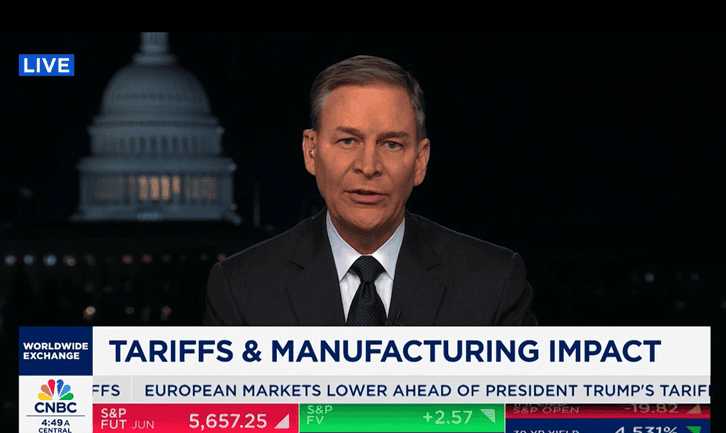
Watch Jay Timmons on “Worldwide Exchange”
Timmons on Upcoming Tariff Announcement
“We don’t know what the actual proposal is going to be, or the actual plan is going to be from the president today, but in any scenario, it’s going to add cost to manufacturers, especially for those inputs that are coming into the United States for finished goods and already finished products. So manufacturers are bracing. We’ve got 14,000 members right now who, frankly, don’t know what the future holds in terms of additional costs, and that’s why you’re seeing this type of concern and sentiment among manufacturers. In fact, three-quarters of manufacturers who we surveyed rate trade uncertainty as their number one concern right now.”
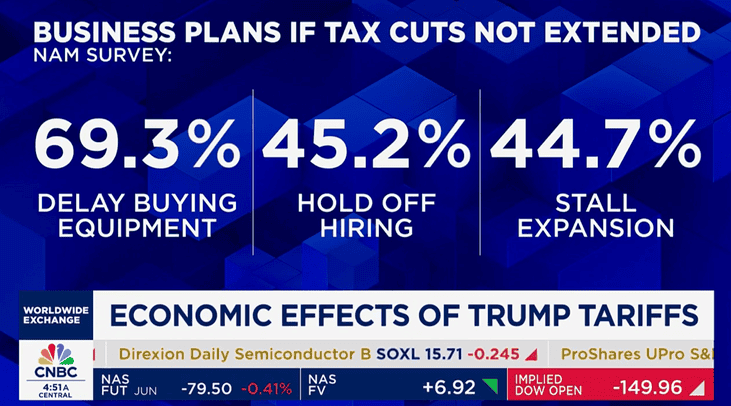
Timmons on Tax Reform, Lowering Costs for Manufacturers
“I think it’s pretty safe to say that everybody would like more things made here in this country, because that’s good for the economy. That’s good for jobs. What is not good, though, is driving up the cost of actually making those things here in the United States. So the first thing that we need … is we need to see Congress, frankly, do its job and get the tax reforms from 2017 renewed, so that … we have the certainty in the tax code. Also the administration is working on reducing the regulatory burden. That’s a lot of costs. That’s about $50,000 per employee per year for a small manufacturer. And then, of course, energy inputs and the cost of energy is important, as well as workforce challenges. We have 500,000 open jobs, for instance, in manufacturing today. So you add all that up, if we could have those advancements and those things that will bring costs down, that’s good for investment here in the United States. Adding costs for inputs, like critical minerals, for instance, really does not help us in the long term.”
…
“There was a lot of enthusiasm when the president came in and talked about strengthening manufacturing here in the United States, talked about an agenda that would lower costs. … If we don’t get the tax reforms renewed, that is an additional cost. If tariffs are imposed, that’s an additional cost. So that’s why you’re seeing consumer sentiment lower. You’re seeing the PMI index that … is now in contraction. That means that manufacturers are putting these decisions on hold. They’re waiting to see whether they should invest and hire, and that’s not good for the economy.”
-NAM-
The National Association of Manufacturers is the largest manufacturing association in the United States, representing small and large manufacturers in every industrial sector and in all 50 states. Manufacturing employs nearly 13 million men and women, contributes $2.93 trillion to the U.S. economy annually and accounts for 53% of private-sector research and development. The NAM is the powerful voice of the manufacturing community and the leading advocate for a policy agenda that helps manufacturers compete in the global economy and create jobs across the United States. For more information about the NAM or to follow us on Twitter and Facebook, please visit www.nam.org.
Timmons: Tariffs Will Add Costs for Manufacturers
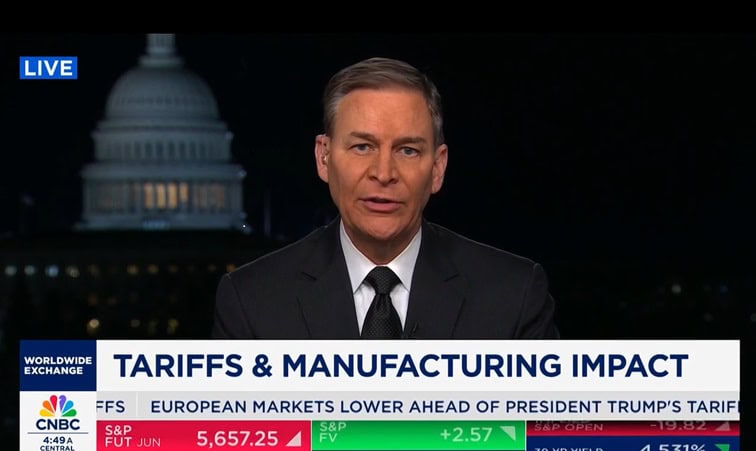
As manufacturers await the announcement of the Trump administration’s sweeping reciprocal tariffs at approximately 4:00 p.m. EDT today, NAM President and CEO Jay Timmons warned that “any scenario … is going to add cost[s] to manufacturers.”
What’s going on: Timmons, appearing on CNBC’s “Worldwide Exchange” this morning, told show anchor Frank Holland that while the world still doesn’t know what the latest tariffs will include, manufacturers are concerned—and they have good reason to be.
- Some 56% of imports to the U.S. are inputs for manufacturing, Holland said, citing NAM data. “That’s why you’re seeing this type of concern and sentiment among manufacturers,” Timmons said in response to a question about what the figure means for tariffs’ impact on the industry.
- Trade uncertainty is the top concern of the majority of manufacturers right now, Timmons said, citing the NAM’s most recent Manufacturers’ Outlook Survey. “That is up 40 percentage points over the last six months,” he told Holland. “That’s a huge jump.”
What it means: While “everybody would like more things made here in this country, because that’s good for the economy, that’s good for jobs,” new tariffs will drive “up the cost of actually making those things here in the United States,” Timmons continued.
What should be done: Manufacturers need certainty, not the nail-biting anxiety that comes from constant changes to the rules.
- “The first thing that we need to see is we need to see Congress do its job and get the tax reforms from 2017 renewed so that we have the certainty in the tax code,” said Timmons.
- Manufacturers also require relief from arduous regulatory burdens, which comes to “about $50,000 per employee per year for a small manufacturer,” Timmons told Holland, adding that the Trump administration is already working to cut those costs.
The bottom line: “There was a lot of enthusiasm when the president came in and talked about strengthening manufacturing here in the United States [and] talked about an agenda that would lower costs,” Timmons concluded.
- “But … if we don’t get the tax reforms renewed, that is an additional cost. If tariffs are imposed, that’s an additional cost. … Manufacturers … are waiting to see whether they should invest and hire. That’s not good for the economy.”
Lawmakers on Taxes, CHIPS, Trade and Workforce
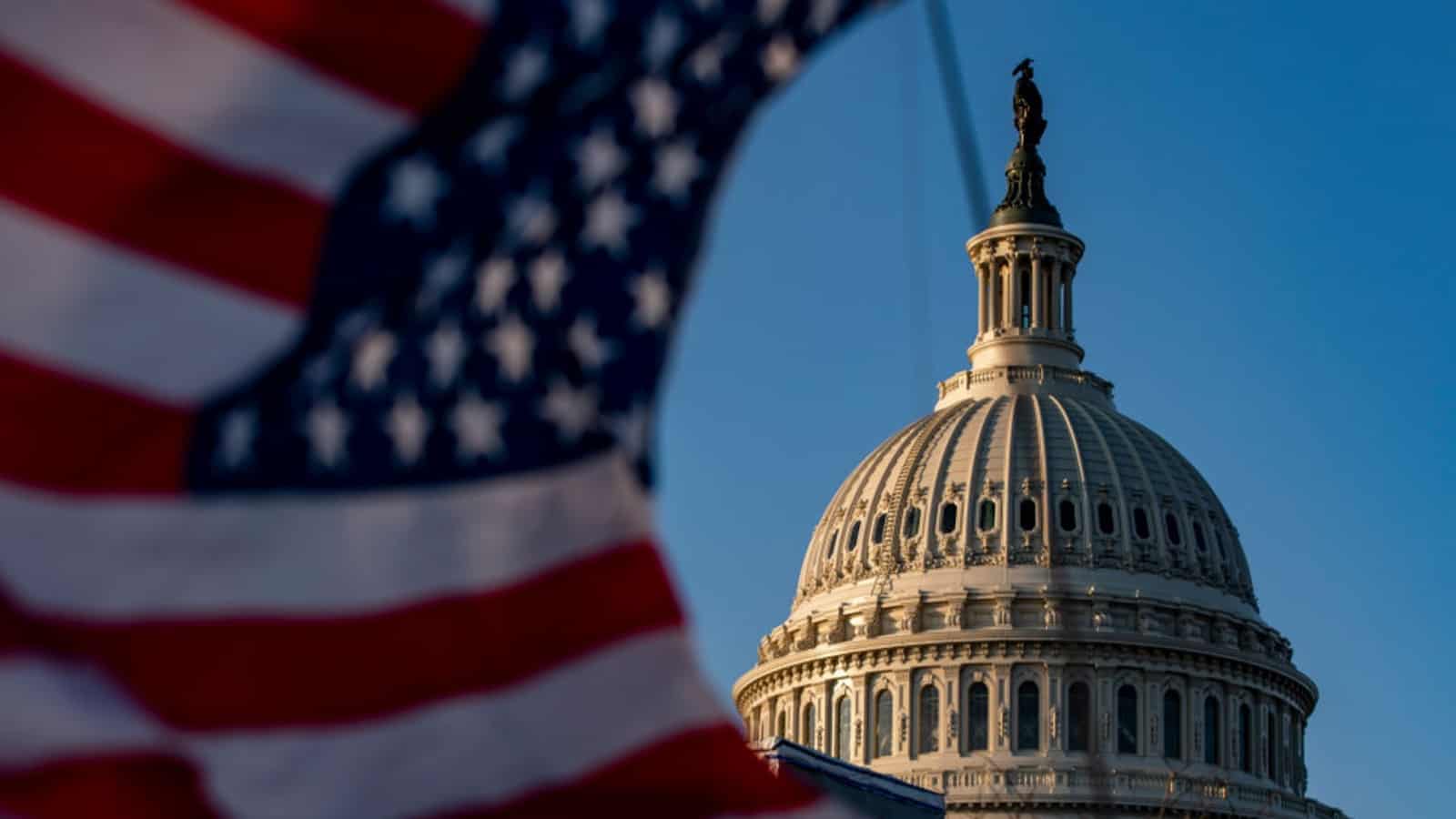
A day after President Donald Trump’s first address to Congress in his second term, the industry remains on edge amid the growing uncertainty of what’s being called a trade war by some in Washington.
What Congress is saying: We’re starting to see public comments from members of Congress on various topics in the president’s speech on Tuesday. Here’s what they’re saying.
Tax reform: House Ways and Means Committee Chairman Jason Smith (R-MO) committed yesterday to delivering a comprehensive tax bill to President Trump by Memorial Day, according to MarketWatch. Echoing NAM President and CEO Jay Timmons’ repeated calls for a swift tax deal, Chairman Smith emphasized the urgency of providing certainty to small businesses and working families, stating, “Failure is not an option.”
- “[W]e have to move this one big, beautiful bill as quickly as possible,” he said.
- In recent weeks, Timmons has leveraged the NAM’s public platform extensively—including through the NAM State of Manufacturing Address, television and radio interviews across the country, social media and op-eds in Ohio and Florida—to press Congress to act now and make the 2017 tax reforms permanent.
CHIPS: New Sen. Jon Husted (R-OH), the former lieutenant governor of the state, expressed support for the CHIPS and Science Act, emphasizing its bipartisan backing and importance of national security. “For the economic and national security of America, we need to make chips in the USA—I believe this is part of an America First agenda,” he wrote in a statement provided to The Columbus Dispatch.
- House Speaker Mike Johnson (R-LA) indicated to Punchbowl that nothing would be discussed on the CHIPS and Science Act until the president’s FY 26 budget.
- Sen. Todd Young (R-IN) said that the president’s mention of the act in his speech was “not consistent with the extensive conversations we’ve had with the administration about the many successes and future of the CHIPS program and how it helps with our shared goal of creating a robust domestic chips supply.”
Trade and workforce: “As I’ve said, tariffs are a tool in the toolbox, but they must be strategic and support American jobs—not create uncertainty that undercuts our domestic manufacturing,” Rep. Debbie Dingell (R-MI) told the Detroit Free Press. “The domestic auto industry currently relies on an integrated North American supply chain, and our trade policies need to reflect that.”
- Sen. Thom Tillis (R-NC) zeroed in on implementation of any tariffs. “If you’re talking about tariffs that are going to be inflationary, causing all kinds of retaliation and disrupting the markets, I’m almost certainly against them,” he said in an interview with CQ Roll Call. “However, if you’re talking about tariffs that are used surgically … to be used judiciously and to build the economy, then I’m all for it.”
- For Sen. Kevin Cramer (R-ND), according to The Wall Street Journal (subscription), “It comes down to how long [the tariffs] would last.” He said you “can’t simply turn on and off an inflationary switch” or flip a switch to build manufacturing facilities in the U.S., “or even harder yet, get the workforce to fill those jobs that would be created, particularly at the same time as you’re shirking immigration.”
Big picture: “Manufacturers are already planning for 2026, and they need the certainty to invest and grow now. We’re seeing bipartisan interest in these priorities, and the NAM is building consensus to achieve exactly that and have even stronger champions for manufacturers in Congress to reinforce what we need to compete and win,” said NAM Executive Vice President Erin Streeter.
Manufacturers to Trump and Congress: Act Now on Comprehensive, Commonsense Manufacturing Strategy as Tariffs Hit Manufacturing Industry
National Association of Manufacturers President and CEO Jay Timmons released the following statement ahead of President Donald Trump’s address to a joint session of Congress:
“The stakes couldn’t be higher for manufacturers right now. Many manufacturers are operating on thin margins, and the tariffs imposed today will further strain their resources. For example:
- A large manufacturer in the power-engineering sector that imports more than $100 million every year in components and products from Mexico now faces increasing costs of $25 million due to the tariffs. As a major supplier to the U.S. utility and industrial market, this will directly impact the ability for domestic utilities and industrial customers to maintain a safe, efficient and secure power grid.
- Another large consumer goods manufacturer indicated the tariffs on Mexico will cost their company $200 million, and the Canadian retaliatory tariffs will add another $31 million—totaling $231 million, or $1.15 million per day.
- A small copper manufacturer had nine truckloads of copper rod sitting at the Canadian border waiting to go through Customs when the tariffs went into effect, leading to 388,000 pounds of copper goods being returned to the supplier. If the tariffs remain in effect, bringing copper—a critical manufacturing input—into the U.S. would cost the manufacturer nearly $50,000 per truckload going forward.
“To mitigate the adverse effects of today’s tariffs, manufacturers call on President Trump and Congress to implement a comprehensive manufacturing strategy that would create predictability and certainty to invest, plan and hire in America. This strategy includes the following actions:
- Make President Trump’s 2017 tax reforms permanent and more competitive now. When President Trump signed these tax cuts into law, it was rocket fuel for manufacturing in America and made the U.S. economy more competitive on a global scale. That fuel is about to run out as key provisions have expired, and others are about to lapse. If Congress fails to act, it will cost America 6 million jobs, including more than 1.1 million manufacturing jobs. We must ensure these historic, pro-growth manufacturing provisions are made permanent and even more competitive so manufacturers can plan, grow and succeed.
- Restore regulatory certainty. Manufacturers are spending $350 billion each year just to comply with regulations—money that could be spent on expanding factories and production lines, hiring new workers or raising wages. President Trump has taken action already to streamline burdensome regulations starting with lifting the liquefied natural gas export ban, but we need to move faster to deliver on our industry’s potential.
- Expedite permitting reform to unleash American energy. President Trump is already ending the war on America’s energy producers, but there is more work to do. America should be the undisputed leader in energy production and innovation, but we will not reach our full potential without permitting reform. We are seeing opportunities for energy dominance fade in the face of a permitting process that takes 80% longer than other major, developed nations.
- Strengthen the manufacturing workforce. Over the past year, we have averaged 500,000 open manufacturing jobs in America—well-paying, life-changing careers. Manufacturers are struggling to fill critical jobs. We need a real workforce strategy that ensures we have the talent to grow, compete and lead.
- Implement commonsense trade policies that open global markets fairly and effectively. Building things in America only works if we can sell them around the world. That’s why we’re urging President Trump and Congress to provide greater predictability and a clear runway for manufacturers to adjust to new trade realities, while also making way for exemptions for critical inputs, enabling reciprocity in manufacturing trade.
“Manufacturers are investing in America in record numbers, and President Trump is focused on strengthening manufacturing in the United States to grow our nation’s economy. We look forward to working with President Trump as he works to advance policies that will help manufacturers thrive and prosper because when manufacturing wins, America wins.”
-NAM-
The National Association of Manufacturers is the largest manufacturing association in the United States, representing small and large manufacturers in every industrial sector and in all 50 states. Manufacturing employs nearly 13 million men and women, contributes $2.93 trillion to the U.S. economy annually and accounts for 53% of private-sector research and development. The NAM is the powerful voice of the manufacturing community and the leading advocate for a policy agenda that helps manufacturers compete in the global economy and create jobs across the United States. For more information about the NAM or to follow us on Twitter and Facebook, please visit www.nam.org.
State of Manufacturing 2025: When Manufacturing Wins, America Wins
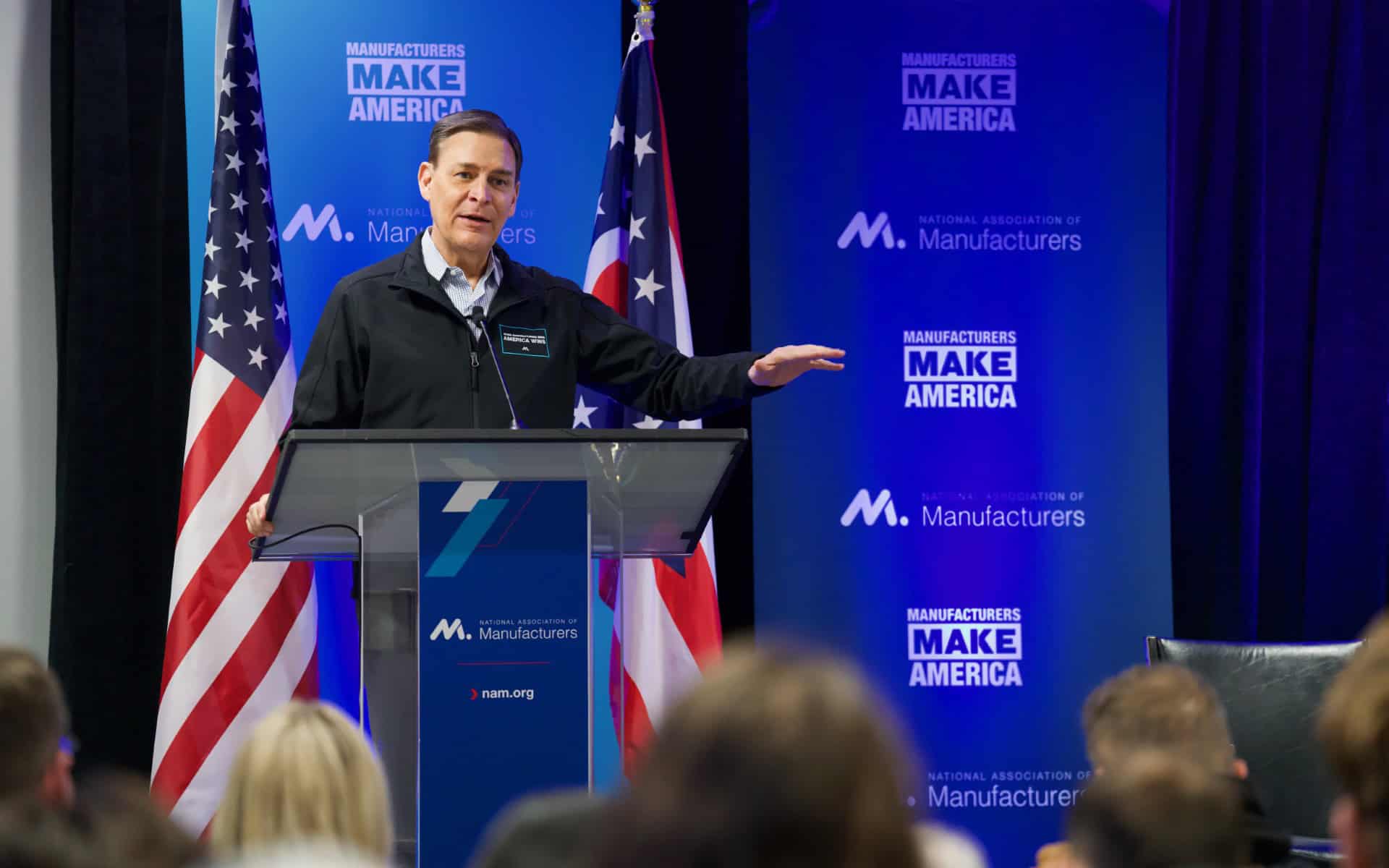
“Manufacturing in the U.S. has momentum”—and to keep it going, manufacturers will need to push, NAM President and CEO Jay Timmons said Tuesday in the NAM’s annual State of Manufacturing Address.
What’s going on: Speaking to an audience of manufacturers and congressional and state officials at Armstrong World Industries in Hilliard, Ohio, Timmons, who was joined by NAM Board Chair and Johnson & Johnson Executive Vice President and Chief Technical Operations & Risk Officer Kathy Wengel, emphasized the “defining moment” for the industry and said that for manufacturing, “what happens next really matters.”
- “Uncertainty is the enemy of investment,” he told the crowd. “Manufacturing is a capital-intensive industry. We make decisions months and years in advance. … That’s why we need certainty. We need a clear, actionable, multistep strategy from our government—one that says, ‘We want you to invest here, hire here and succeed here.’”
- Timmons’ annual speech kicked off the NAM’s 2025 Competing to Win Tour, starting with a whirlwind four-states-in-four-days tour of manufacturing facilities, schools, government offices and more.
- “In Ohio, manufacturers have thrived because our leaders have taken decisive actions to keep our industry competitive,” Ohio Manufacturers’ Association President Ryan Augsburger said at the kickoff event. But now, “manufacturers across Ohio and the nation are facing critical challenges, from tax uncertainty, project delays and workforce shortages to supply chain vulnerabilities and price pressures that threaten our ability to grow. … These issues cannot wait.”
What manufacturing needs: Certainty from the federal government should come in several forms, Timmons said, including the following:
- Preserving tax reform: The 2017 tax reforms were “rocket fuel” for manufacturing in America—but key provisions have expired and others are scheduled to sunset. Congress must bring them back and improve and extend the package. “Every day that Congress delays because of process and politics, manufacturers face rising uncertainty, delayed investments and fewer jobs,” said Timmons.
- Regulatory clarity and consistency: Manufacturers today spend a total of $350 billion just to comply with regulations. “Commonsense regulation is critical to American manufacturers to continue to innovate, to compete against foreign manufacturers and to improve the lives of American citizens,” Austin So, general counsel, head of government relations and chief sustainability officer for Armstrong World Industries, told the crowd.
- Permitting reform: President Trump’s lifting of the liquefied natural gas export permit ban was a start, but to reach our full potential as energy leader, we must require “federal agencies to make faster decisions and reduc[e] baseless litigation,” said Timmons.
- Energy dominance: “America should be the undisputed leader in energy production and innovation. But … we are seeing opportunities for energy dominance fade in the face of a permitting process that takes 80% longer than other major, developed nations,” Timmons said, adding that we must cut red tape, require federal agencies to make faster decisions and reduce meritless litigation.
- Workforce strategy: By 2033, manufacturing faces a shortfall of 1.9 million manufacturing employees, Timmons said. To fill those positions, the sector needs a “real workforce strategy,” one that includes apprenticeships, training programs and public–private partnerships.
- Commonsense trade policy: If President Trump continues to use tariffs, “we need a commonsense policy … that provides manufacturers with the certainty to invest” and “a clear runway to adjust,” according to Timmons.
State of manufacturing: “Manufacturing in the United States is moving forward,” Timmons said. “Like a press at full speed, like a production line firing on all cylinders, like the workers who show up before dawn and leave long after the job is done—manufacturing in the United States is driving us forward.” And Timmons added that now it’s time “to make America Great for Manufacturing Again.”
On the move: Following the speech, Timmons, Wengel and Augsburger joined state lawmakers, including state Sens. Kristina Roegner and Andrew Brenner, and local business leaders for a visit to the Ohio Statehouse for an event focused on the importance of tax reform for Ohio and its manufacturing sector.
- A recent NAM study found that, if key provisions of tax reform are allowed to expire, Ohio would risk losing 208,000 jobs and $18.9 billion in wages.
What’s at stake: Tax reform was transformational for Humtown Products, the Columbiana, Ohio–based family-owned sand cores and molds manufacturer, President and CEO Mark Lamoncha told the audience at the Ohio Statehouse tax event.
- “We have been at the forefront of 3D-printed manufacturing for years and have invested significantly in the machinery and equipment required, including the purchase of 3D printers—one of which can easily cost over $1 million,” he said.
- “Since the 2017 tax reform, Humtown has invested over $9 million in capital expenditures related to 3D printing and averages around $100,000 annually in R&D costs. Under the 2017 tax reform, we were able to deduct 100% of those costs, generating around $1.6 million in accelerated tax savings.”
- “That amount alone allowed us to purchase another 3D printer, fueling continued growth. That’s what tax certainty allowed us to do. But right now, that certainty is slipping away. As these provisions begin to expire, our tax burden is increasing.”
Creators Wanted: The group also fit in a stop at Columbus State Community College, which serves approximately 41,000 students, to visit with students in the semiconductor and mechanical drive classes.
The last word: The NAM recently “stood shoulder-to-shoulder with congressional leaders—delivering a clear, urgent message on tax reform” and is “driving the agenda on regulatory certainty, on energy dominance, on permitting reform, health care and workforce development,” Wengel told the audience. “The NAM is not waiting for Washington to act; we are making sure Washington acts for you, for manufacturers.”
- Added NAM Executive Vice President Erin Streeter: “The NAM is on [these issues], and we’re going to keep fighting, as we do every day with the right leaders, the right strategies and the right vision for the future.”
Manufacturers Need a Jolt of Certainty
As New Tariffs Announced, NAM Calls on Congress to Act Now on 2017 Tax Reform Renewal and Permitting Reform
Washington, D.C. – National Association of Manufacturers President and CEO Jay Timmons released the following statement:
“Manufacturers in the United States are facing intense global competition, economic headwinds and unfair trade practices from adversarial nations. With critical tax reforms having lapsed and others still set to expire as well as inaction on comprehensive permitting reform, our industry is struggling to invest, innovate and compete.
“Manufacturing is a capital-intensive industry—and we must plan months and often years in advance to grow and compete. We cannot afford to wait on action, especially with additional cost pressures from the renewal and extension of tariffs. Manufacturers are calling on Congress to act now to renew the 2017 Tax Cuts and Jobs Act—failure to do so will put 6 million jobs at risk and make it even harder for manufacturers to drive growth and strengthen supply chains. We cannot risk giving our competitors an edge while jeopardizing American jobs and economic strength.”
-NAM-
The National Association of Manufacturers is the largest manufacturing association in the United States, representing small and large manufacturers in every industrial sector and in all 50 states. Manufacturing employs nearly 13 million men and women, contributes $2.93 trillion to the U.S. economy annually and accounts for 53% of private-sector research and development. The NAM is the powerful voice of the manufacturing community and the leading advocate for a policy agenda that helps manufacturers compete in the global economy and create jobs across the United States. For more information about the NAM or to follow us on Twitter and Facebook, please visit www.nam.org
Mexico, Canada Tariffs Paused
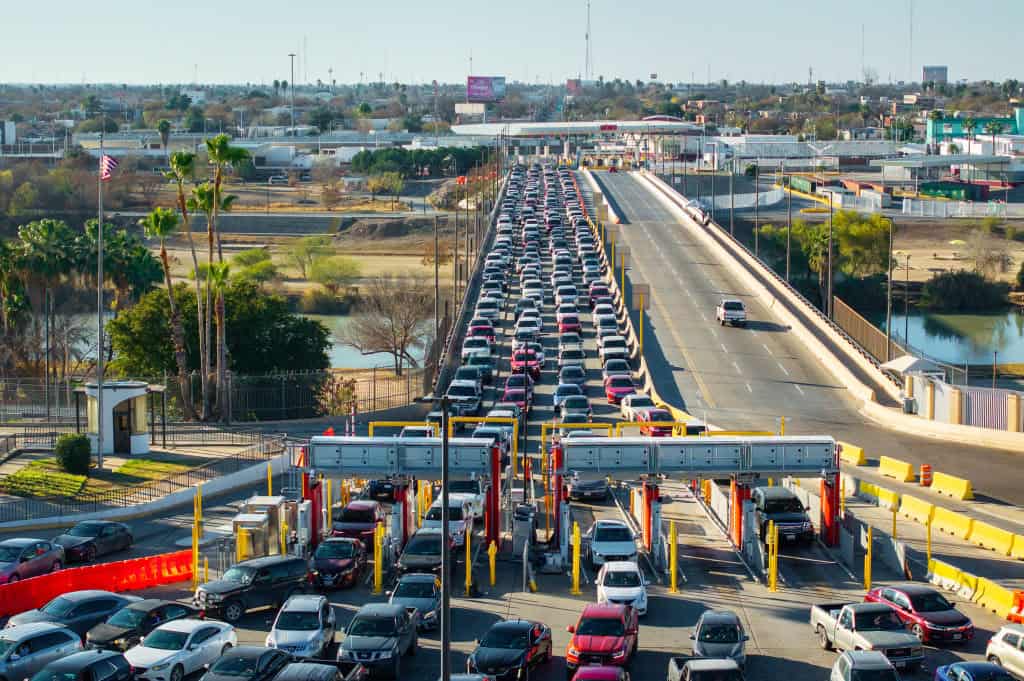
By deciding to pause the imposition of tariffs he announced last weekend on Mexico and Canada, President Trump shows he’s hearing manufacturers “loud and clear,” the NAM said yesterday.
What’s going on: Two days after signing three separate executive orders under the International Emergency Economic Powers Act to add new levies on goods from Mexico, Canada and China, President Trump announced a one-month pause yesterday on the 25% tariff on Mexican goods and the 25% tariff on Canadian goods, including the 10% levy on energy products.
- President Trump, who had cited illegal immigration and the flow of illicit drugs into the U.S. as the impetus for the new tariffs, said Mexican President Claudia Sheinbaum agreed Monday morning to “immediately supply” 10,000 Mexican National Guard troops to the border.
- The announcement about the tariffs on goods from Canada came following an afternoon phone call between President Trump and Canadian Prime Minister Justin Trudeau.
- The 10% additional tariff applying to products from China went into effect today. In response, China announced retaliatory tariffs on certain goods imported from the U.S., as well as additional restrictions on critical minerals exports to the U.S. (The Wall Street Journal, subscription).
Staying competitive: “This decision by President Trump reflects his swift move to keep his campaign promises, balancing a commitment to aggressive border enforcement with the need to keep manufacturing in the United States competitive,” NAM Executive Vice President Erin Streeter said.
- “The NAM has worked closely with the administration, ensuring that the voices of manufacturers were heard loud and clear. Throughout the weekend, we engaged directly with senior officials, providing key data and real-world industry perspectives. Our efforts helped underscore the risks of broad-based tariffs and the importance of North American supply chains to manufacturing’s success.”
- NAM President and CEO Jay Timmons reinforced President Trump’s and the manufacturing sector’s priorities in interviews Monday with CNBC and ABC, as well as in a statement cited by the Wall Street Journal editorial board.
Certainty needed: For manufacturing in the U.S. to thrive, “we need to bring costs down,” Timmons told ABC. “And if you don’t have that, or you have the uncertainty of what’s coming next, manufacturers are reluctant to invest in new plants and equipment and facilities. They’re reluctant to hire new workers … raise wages or increase benefits. … Once we get all this sorted out, I think it will be good news for manufacturers,” but the sooner that happens, the better, he concluded.
- Timmons also discussed President Trump’s landmark 2020 U.S.–Mexico–Canada Agreement, which he said provided manufacturers with the certainty the sector requires.
- “The certainty that was provided by a negotiated and accepted trade agreement by the three countries enabled manufacturers to make investment decisions,” Timmons told CNBC. “Now we have more uncertainty about what’s ahead … but we assume that there is a rationale for this.”
Key statistics: The USMCA was vital in shifting key imports away from China to North America. According to a new NAM fact sheet:
- Fully one-third of all U.S. manufacturing inputs come from Canada and Mexico;
- Some 70% of what we import from Canada and nearly 60% of imports from Mexico are capital equipment, industrial supplies and automotive parts that go into further manufacturing in the U.S.; and
- The value of U.S. imports of manufacturing materials from North America is now three times greater than the value of materials coming from China.
The bottom line: “We appreciate the administration’s continued willingness to receive our data and manufacturing stories,” Streeter went on. “We will continue working with policymakers to ensure that future decisions support both national security and manufacturing’s success.”
NAM in the news: The NAM’s advocacy received widespread attention in the media, with Fox Business, CNBC, Bloomberg (subscription), CNN, The New York Times (subscription), Punchbowl News and a Wall Street Journal (subscription) article all highlighting its statements on the impact of tariffs on manufacturers.
- Its positions were also mentioned on “Bloomberg Surveillance,” CTV News Channel, MSNBC’s “Inside with Jen Psaki” and MSNBC’s “Morning Joe.”
NAM Update: President Trump Imposes New Tariffs on Canada, Mexico and China
On Feb. 1, President Donald Trump imposed 25% tariffs on products from Canada with lower 10% on energy products, 25% tariffs on products from Mexico and an additional 10% on products from the People’s Republic of China.
NAM Vice President of International Policy Andrea Durkin and her team break down the actions for manufacturers:
Executive orders impose tariffs on Canada, China and Mexico: On Feb. 1, President Trump, through three separate executive orders, declared a national emergency and invoked the International Emergency Economic Powers Act to apply ad valorem tariffs on products from Canada, Mexico and China, citing the sustained influx of illicit opioids and other drugs.
- Canada Executive Order:“Imposing Duties to Address the Flow of Illicit Drugs Across Our Northern Border”
- China Executive Order: “Imposing Duties to Address the Synthetic Opioid Supply Chain in the People’s Republic of China”
- Mexico Executive Order: “Imposing Duties to Address the Situation at the Southern Border”
How tariffs will apply:
- For products from Canada:
- A 25% tariff will be applied in addition to any already applicable duties, fees or charges.
- A 10% tariff will be applied to “energy or energy resources” defined as crude oil, natural gas, lease condensates, natural gas liquids, refined petroleum products, uranium, coal, biofuels, geothermal heat, hydropower and critical minerals.
- For products from China:
- A 10% tariff will be applied in addition to any already applicable duties, fees or charges.
- For products from Mexico:
- A 25% tariff will be applied in addition to any already applicable duties, fees or charges.
- No duty drawback:No drawback shall be available with respect to the duties imposed pursuant to these orders.
- De minimis: Duty-free de minimis treatment will be suspended.
Timing of the tariffs:
- Tariffs will apply from Feb. 4, 2025.
- Tariffs will not apply to goods loaded onto a vessel or in transit before 12:01 a.m. Feb. 1 with certification to U.S. Customs.
Duration of tariffs: The tariffs will remain in place until the president determines that the governments of Canada, Mexico and/or China have taken “sufficient action to alleviate the crisis,” including through cooperative enforcement actions.
A retaliation clause: The president may increase or expand in scope the tariffs imposed under these executive orders if the governments of Canada, Mexico and/or China impose retaliatory tariffs.
Reports to Congress: The Secretary of Homeland Security, in coordination with the Secretary of the Treasury and other agencies, will submit recurring and final reports to Congress on the state of the national emergency under these orders.
What’s next: The NAM issued a statement in response, and the NAM trade team is analyzing the impact on manufacturers and will continue to engage policymakers on these sweeping trade actions.
